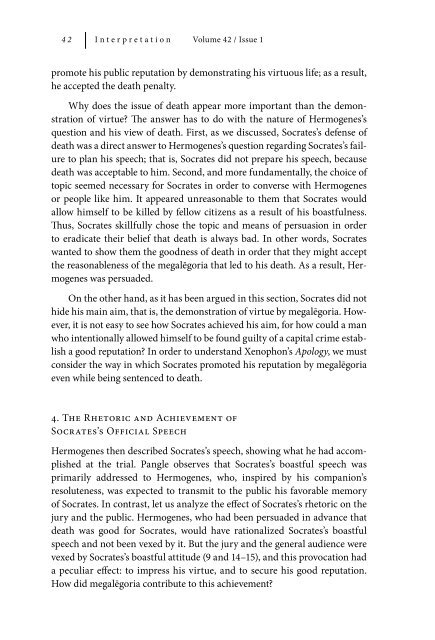Fall 2015
Vol_42_1
Vol_42_1
- No tags were found...
Create successful ePaper yourself
Turn your PDF publications into a flip-book with our unique Google optimized e-Paper software.
4 2 I n t e r p r e t a t i o n Volume 42 / Issue 1<br />
promote his public reputation by demonstrating his virtuous life; as a result,<br />
he accepted the death penalty.<br />
Why does the issue of death appear more important than the demonstration<br />
of virtue? The answer has to do with the nature of Hermogenes’s<br />
question and his view of death. First, as we discussed, Socrates’s defense of<br />
death was a direct answer to Hermogenes’s question regarding Socrates’s failure<br />
to plan his speech; that is, Socrates did not prepare his speech, because<br />
death was acceptable to him. Second, and more fundamentally, the choice of<br />
topic seemed necessary for Socrates in order to converse with Hermogenes<br />
or people like him. It appeared unreasonable to them that Socrates would<br />
allow himself to be killed by fellow citizens as a result of his boastfulness.<br />
Thus, Socrates skillfully chose the topic and means of persuasion in order<br />
to eradicate their belief that death is always bad. In other words, Socrates<br />
wanted to show them the goodness of death in order that they might accept<br />
the reasonableness of the megalēgoria that led to his death. As a result, Hermogenes<br />
was persuaded.<br />
On the other hand, as it has been argued in this section, Socrates did not<br />
hide his main aim, that is, the demonstration of virtue by megalēgoria. However,<br />
it is not easy to see how Socrates achieved his aim, for how could a man<br />
who intentionally allowed himself to be found guilty of a capital crime establish<br />
a good reputation? In order to understand Xenophon’s Apology, we must<br />
consider the way in which Socrates promoted his reputation by megalēgoria<br />
even while being sentenced to death.<br />
4. The Rhetoric and Achievement of<br />
Socrates’s Official Speech<br />
Hermogenes then described Socrates’s speech, showing what he had accomplished<br />
at the trial. Pangle observes that Socrates’s boastful speech was<br />
primarily addressed to Hermogenes, who, inspired by his companion’s<br />
resoluteness, was expected to transmit to the public his favorable memory<br />
of Socrates. In contrast, let us analyze the effect of Socrates’s rhetoric on the<br />
jury and the public. Hermogenes, who had been persuaded in advance that<br />
death was good for Socrates, would have rationalized Socrates’s boastful<br />
speech and not been vexed by it. But the jury and the general audience were<br />
vexed by Socrates’s boastful attitude (9 and 14–15), and this provocation had<br />
a peculiar effect: to impress his virtue, and to secure his good reputation.<br />
How did megalēgoria contribute to this achievement?


